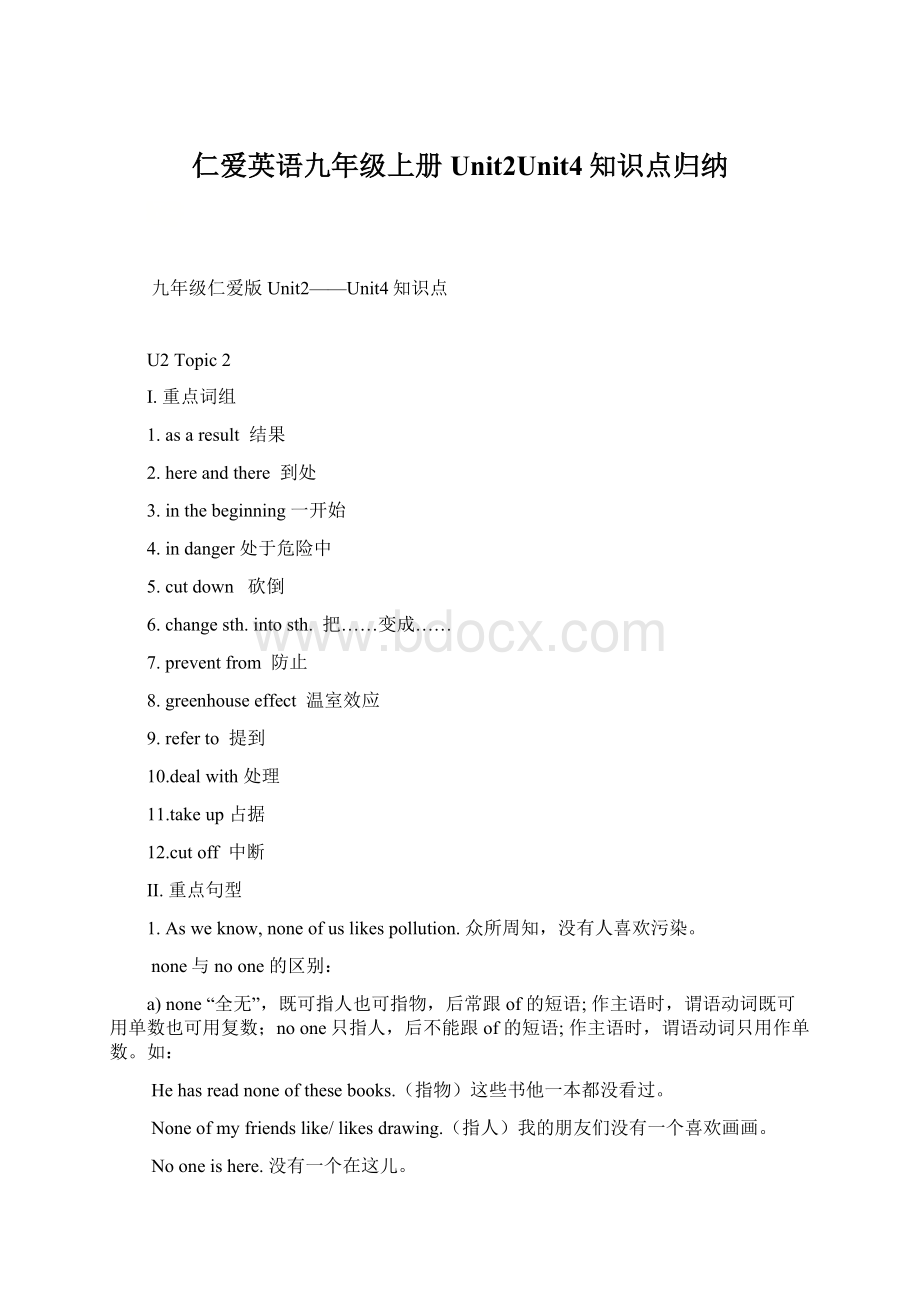 仁爱英语九年级上册Unit2Unit4知识点归纳.docx
仁爱英语九年级上册Unit2Unit4知识点归纳.docx
- 文档编号:8577023
- 上传时间:2023-01-31
- 格式:DOCX
- 页数:16
- 大小:34.86KB
仁爱英语九年级上册Unit2Unit4知识点归纳.docx
《仁爱英语九年级上册Unit2Unit4知识点归纳.docx》由会员分享,可在线阅读,更多相关《仁爱英语九年级上册Unit2Unit4知识点归纳.docx(16页珍藏版)》请在冰豆网上搜索。

仁爱英语九年级上册Unit2Unit4知识点归纳
九年级仁爱版Unit2——Unit4知识点
U2Topic2
I.重点词组
1.asaresult 结果
2.hereandthere 到处
3.inthebeginning一开始
4.indanger处于危险中
5.cutdown 砍倒
6.changesth.intosth. 把……变成……
7.preventfrom 防止
8.greenhouseeffect 温室效应
9.referto 提到
10.dealwith处理
11.takeup占据
12.cutoff 中断
II.重点句型
1.Asweknow,noneofuslikespollution.众所周知,没有人喜欢污染。
none与noone的区别:
a)none“全无”,既可指人也可指物,后常跟of的短语;作主语时,谓语动词既可用单数也可用复数;noone只指人,后不能跟of的短语;作主语时,谓语动词只用作单数。
如:
Hehasreadnoneofthesebooks.(指物)这些书他一本都没看过。
Noneofmyfriendslike/likesdrawing.(指人)我的朋友们没有一个喜欢画画。
Nooneishere.没有一个在这儿。
b)none回答howmany/much的问题;noone回答who的问题。
如:
A:
Howmanystudentscometoschoolbytaxi?
B:
None.
有多少的学生搭出租车来上学?
没有人。
A:
Howmuchwateristhereinthebottle?
B:
None.
瓶子里有多少水?
一点儿也没有。
A:
Whoisintheroom?
B:
Noone.
谁在房中?
没有人。
2、Treescanalsostopthewindblowingtheearthaway.树木也能防风固土。
stop/preventsb./sth.(from)doingsth.阻止/防止某人或某物做某事
keepsb./sth.fromdoingsth.阻止/防止某人或某物做某事
3、Youmayeithertakeabusorataxi.你们可能搭公车去或者是搭出租车去。
a)either…or…“要么……要么……;或者……或者……”并列连词,连接对等结构;连接主语时,根据就近原则。
如:
Youmaycomeeithertodayortomorrow.你要么今天来,要么明天来。
Wecaneithersingordance.我们可以唱歌或者跳舞。
Eitheryouorheisright.要么你对,要么他对。
b)either单独使用时,是代词,表“二者之一”既可指人也可指物;用作主语时,谓语动词用作单数。
如:
A:
Wouldyoulikecoffeeortea?
B:
EitherisOK
你想要咖啡还是茶?
随便都可以。
Eitherofusisright.我们俩中有一人是对的。
III.语法
不定代词和不定副词:
(一)不定代词:
指人:
someone/somebodyanyone/anybodynoone/nobodyeveryone/everybody
指物:
somethinganythingnothingeverything
(二)不定副词
指地点:
somewhereanywherenowhereeverywhere
(三)用法:
1.some-复合代词/副词常用于肯定句;如:
Isawsomeoneintheroom.我看见房间里有人。
Thereissomethinginthewoods.树林里有什么东西。
2、any-复合代词/副词常用于否定句或疑问句;如:
Ididn’tseeanyoneintheroom.我没看见有人在房间里。
Thereisn’tanythinginthewoods.树林里没有什么东西。
3、no-复合代词/副词表全否定;如:
Isawnobodyintheroom.我看见房间里没有人。
Thereisnothinginthewoods.树林里没有什么东西。
4、·every-复合代词/副词代替全部;如:
Everyoneishere.大家都在这儿。
Itseemsheknowseverything.似乎他知道一切。
※some-复合代词/副词用于疑问句中时,表希望得到对方的肯定回答或表请求;如:
Wouldyoulikesomethingtodrink?
你要点喝的东西吗?
※any-复合代词/副词用于肯定句时,表“任何”;如:
Ifpeoplespitanywhereinpublic,theyshouldbepunished.
如果人们在公众的任何地方吐痰,他们应该受罚。
※不定代词作主语时,谓语动词用单数形式;如:
Nooneknowsthissecret.没有一人知道这个秘密。
Everythinggoeswell.一切进展顺利。
※如果有定语修饰,定语应放在不定代词或不定副词后;如:
Ihavesomethingimportanttotellyou.我有重要的事告诉你。
Thereisnobodystrangehere.这儿没有一个陌生人。
※no=notany→nobody=notanybody;nothing=notanything
Shedidn’tsayanything.=Shesaidnothing.她什么也没说。
Thereisnobodystrangehere.=Thereisn’tanybodystrangehere.
这儿没有一个陌生人。
Topic3
I.重点词组
1.notonly…butalso… 不仅……而且……
2.besupposedto应该
3.oughtto应该
4.turnoff 关掉
5.insteadof 代替
6.ontime 准时
7.makesure确保
8.pushforward向前推
9.pushdown 向下
10.pullup 向上拉
11、encouragesbtodosth鼓励某人做某事
12、afterall毕竟aboveall最重要的是......
II.重点句型
1.Weshouldusebothsidesofpaper,andreuseplasticbagsratherthanthrowthemaway.我们应该把纸的两面都使用,将塑料袋再次使用而不是轻易扔掉。
a)both修饰复数名词;而either修饰单数名词;如:
Therearealotoftreesonbothsidesoftheroad.
=Therearealotoftreesoneithersideoftheroad.在路的两边有许多树。
b)ratherthan表“(是)……而不是”;连词,连接对等结构,相当于insteadof
c)如:
Ilikecoffeeratherthantea.=Ilikecoffeeinsteadoftea.
我喜欢咖啡而不是茶.
Helikeslisteningtomusicratherthan/insteadofsinging.
他喜欢听音乐而不是唱歌.
Hewantstogotodayratherthan/insteadoftomorrow.
他想今天走而不明天.
IdidmyhomeworkratherthanwatchedTV.
=IdidmyhomeworkinsteadofwatchingTV.
昨晚我做作业了而不是看电视.
但ratherthan位于句首时,后跟动词原形,它不受句中谓语动词的时态影响。
如:
Ratherthandoitbymyself,Ididn’taskforhelp.
宁可自己干,我没请人帮忙。
2.Everyoneissupposedtodoit.每个人都应该那样做。
besupposedtodosth.指(按规定、习惯、安排等)应当做某事;必须做某事;相当于should;用于否定句时,表“允许”;如:
Teachersaresupposedto/shouldknowalot.老师应该知道很多。
Youarenotsupposedtosmokehere.这里不允许抽烟。
3.First,yououghttoturnoffthelightswhenyouleavearoom.
首先,当你离开房间的时候,应该随手关灯。
oughtto情态动词,表“应该;应当”;语气比should强;指道义上应该做的事,有时含有责备或督促的语气。
should指主观上感到有责任或义务去做。
如:
Yououghttohelpyourmotherdosomehousework.你应该帮你妈妈做些家务。
Weshouldstudyhard.我们应该努力学习。
其否定式和疑问式:
Yououghtn’ttogetupsolateinthemorning.你早晨不应该起这么晚。
OughtItotellherthebadnews?
我该告诉她坏消息吗?
Yes,youought.No,yououghtn’t.
III.语法
并列句:
由两个或两个以上并列而又相互独立的简单句构成。
结构为:
简单句+并列连词+简单句
常用的并列连词有:
and,or,but,while,notonly…butalso
e.g.1.Theriverisdirtyandthetemperatureoftheearthisrising.
2.Theyworkwell,buttheyareslowandcan’trunforlong.
Unit3 Topic1
一.重点词语
1.beableto=can 能够,会
2.can’twaittodosth.迫不急待地做某事
3.havea(good)chancetodosth.有(好)机会做某事
4.practicedoingsth.练习做某事
5.bemadeby…被……制做;bemadeof/from…由……制成;
bemadein…在某地制造
6.onbusiness出差
7.besimilarto…和……相似
8.translate…into…把……翻译成……
9.haveno/sometrouble(in)doingsth.做某事没有/有些困难
10.onceinawhile=sometimes/attimes偶尔,间或
11.whatever=nomatterwhat无论何时
12.aswellas以及
13.mothertongue母语
14.taketheleadingposition处于领先地位
15.encouragesb.todosth.鼓励某人做某事
16.callfor号召
二.重点句型
1.Disneylandisenjoyedbymillionsofpeoplefromallovertheworld.世界上数以百万的人们都喜欢迪斯尼乐园。
2.IhopeIcangothereoneday.希望有一天我能去那儿。
3.Englishiswidelyspokenaroundtheworld.英语在世界上被广泛使用。
4.Itisalsospokenasasecondlanguageinmanycountries.
在许多国家它也被用作第二语言。
5.Itispossiblethatyouwillhavesometrouble.你可能会遇到一些麻烦。
6.It’susedasthefirstlanguagebymostpeopleinAmerica,Canada,Australia,GreatBritainandNewZealand.
它被美国、加拿大、澳大利亚、英国和新西兰的大多数人用作第一语言。
7.Andtwothirdsoftheworld’sscientistsreadEnglish.
并且世界上三分之二的科学家用英语阅读。
三.语法学习
一般现在时的被动语态
英语语态有主动语态和被动语态两种。
主语是动作的执行者,叫主动语态。
如:
Wecleantheclassroom.我们打扫教室。
主语是动作的承受者,叫被动语态。
如:
Theclassroomiscleaned(byus).教室被(我们)打扫。
1. 被动语态的构成:
助动词be+及物动词的过去分词+(by+宾语)
其中by意为“被……;由……”,表动作的执行者。
如:
Theglassisbrokenbythatboy.玻璃杯是那个男孩打破的。
be有人称、数和时态的变化,其肯定式、否定式、疑问式的变化规则与be作为连系动词时完全一样。
如:
Englishiswidelyspokenaroundtheworld.(肯定式)
Englishisnotwidelyspokenaroundtheworld.(否定式)
IsEnglishwidelyspokenaroundtheworld?
(疑问式)
Yes,itis./No,itisn’t.
2. 被动语态的用法:
(1)在没有指明动作的执行者或者不知道动作执行者的情况下可用被动语态。
如:
Thiscoatismadeofcotton.这件大衣是棉制的。
(2)要强调动作的承受者而不是执行者时,用被动语态。
如:
Herbikeisstolen.她的自行车被偷了。
3. 主、被动语态的转换:
主动语态:
主语+及物动词谓语动词+宾语(+其它)
被动语态:
主语+be+及物动词的过去分词+by+宾语(+其它)
注意:
(1)主动、被动互转时,时态不变。
(2)主动句的主语是代词的主格形式,变成被动态by的宾语时,要用宾格形式。
如:
(1) Peoplegrowriceinthesouth. Riceisgrown(bypeople)inthesouth.
(2) Shetakescareofthebaby. Thebabyistakencareof(byher).
Topic2
一. 重点词语
1.seesb.Off给……送行
2.dependon取决于……;依靠……
3.bedifferentfrom与……不同 4.succeedin成功,达成
5.makeyourselfunderstood表达你自己的意思
6.onone’swayto在某人去……的路上
7.regardas把......当做.......
8.leavefor…前往某地/leave…for…离开…去…
9.intwentyminutes二十分钟之后
10.writtenEnglish笔头英语/oralEnglish英语口语
11.generallyspeaking一般说来,大致上说
12.asforsb./sth.至于某人/某物
13.becloseto…靠近……
14.inperson身体上,外貌上;亲自
15.befoundof…爱好……
16.beforcedtodosth.被迫做……/forcesb.todo强迫某人做某事
17.evenworse更糟的是
二、 语法学习
用现在进行时表示将来
现在进行时表示将来时,常有“意图”、“安排”(但不是固定不变的)或“打算”含义。
它表示最近或较近的将来,所用的动词多是位移动词。
如:
come,go,arrive,leave,fly,start,begin,return,open,die
例:
I’mgoing.我要走了。
Whenareyoustarting?
你什么时候动身?
Don’tworry.Thetrainisarrivingheresoon.别着急,火车马上就到了。
表示将来的现在进行时除了用于位移动词外,亦可用于某些非位移动词。
如:
Myuncleismeetingustomorrow.我叔叔明天会见我们。
Sheisbuyinganewbikesoon.她不久将买一辆新自行车。
Topic3
一、 重点词语
1.inpublic在公共场所 2.attimes=sometimes有时
3.feellikedoing=wouldliketodo想要做……
4..giveupsth./doingsth.放弃 5..turntosb.forhelp求助于某人
6..givesb.someadviceon/about…给某人一些有关……的建议
7..beweakin在……方面很差/begoodat在……方面很好
8..beafraidofdoingsth.害怕做某事 9.makemistakes犯错误
10.takeadeepbreath深呼吸 11.thebesttimetodo做某事最好的时间
12.dosomelisteningpractice做些听力训练
13.replyto=answer回答
14.advisesb.todo建议某人做某事(名词advice)
二、 重点句型
1.CouldyoumakeyourselfunderstoodintheU.S.A?
在美国,别人能懂得你的话吗?
2.Idon’tknowwhattodo.我不知道该怎么办?
3.AttimesIfeellikegivingup.有时我想要放弃。
5.Idarenotanswerquestionsinclass,becauseI’mafraidofmakingmistakes.我不敢在课堂上回答问题,困为我害怕犯错误。
8.IinsistthatyoupracticeEnglisheveryday.
我坚持认为你们每天都应该练习英语。
三、 语法学习
wh-+todo wh-是指when,where,which,who(m)及how等连接词,它们和动词不定式连用,即为wh-+todo结构。
这种结构在句中常作主语、表语和宾语,作宾语时可以转换为宾语从句。
(对于谓语动词来说,wh-+todo这个不定式动词的动作是个尚未发生的动作,所以在转换成宾语从句时,通常须加情态动词或用将来时表示未来。
)
如:
Idon’tknowwhattodo.=Idon’tknowwhatIshoulddo.
Shecan’tdecidewhichtobuy.=shecan’tdecidewhichshewillbuy.
反之,如果主句中的主语与宾语从句中的主语一致时,宾语从句(由疑问词引导)通常可以与“疑问词+不定式”互相转换。
如:
Idon’tknowwhatIshoulddo.=Idon’tknowwhattodo.
如果不一致就不能转换。
IwanttoknowwhatMarywilldo.(不能说:
Iwanttoknowwhattodo.)
Unit4 Topic1
一、 重点词汇:
1. be used for +ving 被用做……
2. come true 实现
3. It’s said that 据说
4. during/in one’s life 某人一生
5. be known as 以……(身份)而著名
6. know/say for certain 确切知道/肯定地说
7. all the time 一直、总是
8. no longer=not…any longer 不再
(no more, not…any more)
9. as long as 只要
10. as far as 就……,尽……
11. make a great contribution 对…作出巨大贡献
12. the rest of the time 在其余地时间里
13. at any time 在任何时候
二、 重点句型:
1. Because I’m not allowed to play computer games. 因为我不可以玩电脑游戏。
allow “允许、准许”的意思。
常用于以下几种形式:
(1) allow +n./prep 如:
We can’t allow such a thing.我们不容许这种事情发生。
(2) allow sb. to do sth 允许某人做某事 如:
She allowed me to go fishing.
她允许我去钓鱼。
(3) allow +doing sth 允许做某事 如:
We don’t allow smoking in the reading-room.
我们不允许在阅览室吸烟。
(4) be
- 配套讲稿:
如PPT文件的首页显示word图标,表示该PPT已包含配套word讲稿。双击word图标可打开word文档。
- 特殊限制:
部分文档作品中含有的国旗、国徽等图片,仅作为作品整体效果示例展示,禁止商用。设计者仅对作品中独创性部分享有著作权。
- 关 键 词:
- 仁爱 英语 九年级 上册 Unit2Unit4 知识点 归纳
 冰豆网所有资源均是用户自行上传分享,仅供网友学习交流,未经上传用户书面授权,请勿作他用。
冰豆网所有资源均是用户自行上传分享,仅供网友学习交流,未经上传用户书面授权,请勿作他用。


 铝散热器项目年度预算报告.docx
铝散热器项目年度预算报告.docx
